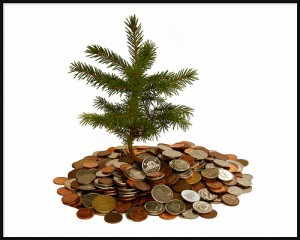 There is a simple life cycle for recycled goods: the things you place out in the recycling bins are picked up, recycled, and then resold to you as something new. Your old phone book, newspaper, and paper bag comes back as a cardboard box to ship Christmas presents off in. Yet, with the economic decrease and consumerism dropping is that cutting into the cycle of recycling? Should we be spending more money and consuming more goods to keep recycling going?
There is a simple life cycle for recycled goods: the things you place out in the recycling bins are picked up, recycled, and then resold to you as something new. Your old phone book, newspaper, and paper bag comes back as a cardboard box to ship Christmas presents off in. Yet, with the economic decrease and consumerism dropping is that cutting into the cycle of recycling? Should we be spending more money and consuming more goods to keep recycling going?
Should we consume more to recycle more?
That is the basic premise of an interesting article on NPR – Recycling Industry Slows As Consumers Shop Less. The story shares how one man in the recycled fibers business is seeing declining profits. As fewer people shop there is a lower demand for the packaging boxes made from recycled products.
Those small, individual choices to hold off on certain purchases put fewer boxes under their Christmas trees and mean there’s less cardboard and paper to recycle.
On the outside this does seem to be a problem. Not only the negative financial effects for those in the recycling business but also for recycling itself. The paper fiber originally shipped overseas to China to be turned into recycled cardboard boxes for shipping toys and other gifts now sits at the dock, unused and unwanted. The cycle of recycled goods comes to an abrupt halt.
Look deeper though and you might see where this problem begins to break down. Though the current down swing of shopping means there are crates of fibers not being used, it also means that there will be less coming in. Supply and demand, even in recycling, eventually even themselves out. With fewer packages being used the supply of packaging being recycled will also diminish. Along with it a decrease in other paper products such as magazines and
That’s not only bad news for Dryden and wastepaper exporters; it brings up a completely different question: If China doesn’t want recycling from the U.S. anymore, what happens to it?
This decrease in demand from overseas companies may be just what the U.S. needs. Despite the benefits that recycling brings, there is still a negative side to shipping the products so far away. The environmental effect of long distance transport is one very real issue to look at (and one to try to avoid by shipping without the waste). As well as the financial issues of job loss in the U.S. Given a chance this could be just the spark we need to increase recycled product use here in the states and possibly create a few new job avenues. As the price for the recyclable fibers drops we may see more small businesses able to buy them, increasing small businesses while keeping the reuse-it spirit alive.
Are we doing harm to the waste paper industry by not buying that new TV, video game system, and shipping over boxes of toys from China? Personally I don’t think we are. The purpose of recycling is to reuse what we have in order to save more for tomorrow. Linking that with a reason to become mass consumers seems absurd. Should we consume more to recycle more? Absolutely not!
Image: pfala at Flickr under Creative Commons
[…] to the US. Is this good for the environment. Of course not. Eco Child’s Play published an article following the NPR story. As was illustrated there, one solution is to do more of the recycling here in the US. Create […]